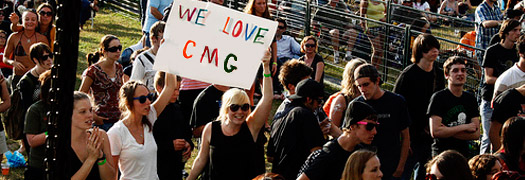
Features | Festivals
Cisco Ottawa Bluesfest 2008
By Conrad Amenta | 21 July 2008
:: Photos by Cait Powers (for more Bluesfest photos, visit http://www.flickr.com/photos/caitpowers)
In my coverage of last year’s Bluesfest I noted how the festival has moved—strangely, when you consider it—from its mainstream blues focus to a nourishing connect with Torontonian indie, with what seems like ongoing deals with Arts & Crafts and Paper Bag records; a hometown connection with the Black Sheep stage; and a seemingly preternatural leaning towards knowing booking and stage sequencing. This culminated in last year’s event, which saw performances by Sharon Jones and the Dap Kings, Shout Out Out Out Out, Built to Spill, and Cat Power alongside powerhouse acts White Stripes, Kanye West, Van Morrison, and Bob Fucking Dylan. And on the grounds of the National War Museum, no less. Its surreality was too good to be true, if anything.
So my surprise should hardly be complete that this strange hybrid should continue to in a direction so extreme in its mainstreamness so as to become a bit alienating. For every instance of estrangement I might express at this festival’s movement towards more profitably mainstream touchstones, there’s another person preceding me who longs for the presence of Johnny Lang and gets up for the annual recurrence of the intolerable Tony D and the Power Hour. Ottawa’s Bluesfest perpetually speaks to divides, cleaves audiences into demographics, throws hapdash tastes into tumultuous mixes without any of the celeritous backpatting for diversity that comes from semi-utopian excuses to get lit. Blues and rock; old and new. Last year I followed alongside all of those who sneered at the deck chairs and BBQ; this year I may as well join them.
Sure, there’s mainstays Feist and Metric, local favorites the Acorn and HILOTRONS, war horses Calexico, festival newbies TV on the Radio, Budos Band, Ladytron, Hayden, Born Ruffians, Plants and Animals, and the singular, semi-exploitative experience of watching a Brian Wilson who doesn’t seem like he wants to be there. But there’s also…Fergie. And Snoop Dogg. Wyclef Jean, Steely Dan, the Black Crowes, and James Taylor. Now, more than ever, audiences face a festival with a serious identity crisis. Truly, anything that earnestly advertises itself as “Funk-a-licious,” even with a decidedly un-funky lineup, has the kind of audacity generally located in the insecurities of premature parenthood, a mid-life crisis. Or, as Tokyo-ites call them, as I’m been informed by a Japanese friend much to my delight, “little old bad men.”
My totally bitchin’ four-year-old Nikon Koolpix point-and-shoot notwithstanding, I opted to bring along a person with skill behind the lens. In addition to her talent, Cait Powers remains frustratingly and exponentially cooler than I, and, lacking the charms she possesses to match her skill, I did not, as she did, talk my way into Matt Mays’ trailer about thirty minutes after arriving. I had to content myself with the wall of sludge rock proffered by the Secret Machines announcing, misleadingly it turns out, that I Mother Earth had reformed. Their formidable performing skills aside, some lyrics about a “she” who “broke shackles” did little to warm me as I waited for TV on the Radio to come on.
The Brookynites performed, despite translating their energy through a corporate lens (heightened, perhaps, by the fact that they were ostensibly opening for the Tragically Hip and the types of fans that come with them), with an obviously genuine and infectious enthusiasm. “Satellite” was transformed into a rockabilly bop, and “Staring at the Sun” was greeted rapturously by the thinning crowd, most of whom were migrating to the main stage in preparation for “New Orleans is Sinking” for the billionth time. Pseudo-industrial tunes like “I Was a Lover” and “Young Liars” were pauses to greater energies, punk-infused and surprisingly anthemic versions of “Let the Devil In” and “Wolf Like Me.” I’m not a huge fan of TVOTR, and their show didn’t turn me, but I was genuinely won over by their graciousness, their ability to perform an unadulterated set of their music entirely independently of the context in which they were forced to perform.
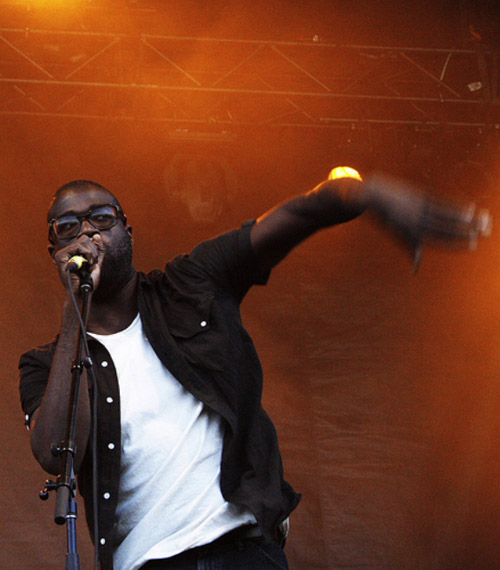
TV on the Radio
Day two the Festival of Bad Tattoos began with the revelation that Cait and I almost hadn’t been given our press passes because the organizer of a festival calling itself “Funk-a-licious” had never heard of CMG, despite our coverage of last year’s festival (the link for which I provided several times). I can only speak for myself when I say that this I eventually came to consider a compliment. More discouraging, however, is that they turned to a local promoter who considers himself a vocal proponent of the DIY aesthetic to confirm CMG’s good standing (one who went so far as to discourage graduates of Carleton’s journalism program from applying to write for his zine, something I think attributes to its quick failure), and he almost refused to do so despite the fact that CMG represents one of the more widely read voluntary music journalism outlets online. I’m probably not making any friends by putting this to page, but there’s credibility, uncompromising principles, and looking oneself in the mirror and all that. I’ll throw the meager influence my support provides to the competition for his monopolist all-ages hardcore shows from now on.
Now is as good as any time, I suppose, to say that the organizing paradigm behind this year’s Bluesfest can charitably be described as having its head up its ass. Instead of organizing bands by stage and asking attendees to pay for passes to the stage correlating the closest to their personal taste, tickets are sold by day (with an all-access pass running in the area of $230). The result being that those looking to check out Plants and Animals or Zappa Plays Zappa are forced to shell out for Steely Dan and the aforementioned numerous occurrences of Tony D. Last year that cost was somewhat mitigated by the canonical Bob Dylan and Van Morrison. Other festivals who more knowingly tailor their scope to an understanding of their demographic involve trust, to the degree that, sure, I can have not heard of half the bands who play Pitchfork’s festival, but I know that they’ll fall somewhere in the ballpark of my taste. This year, besides Brian Wilson, the experience has the sinking feeling of having been mugged. Call me cynical. But anyone taking the high ground and saying that attendees should be grateful to pay all that extra money for the opportunity to learn about such hidden gems as Great Big Sea truly doesn’t know what Ottawa residents are about.
Ladytron, runners up to Magnolia Electric Co. for the How the Hell Are They Wearing That Much Black in this Heat? award, proved once again the ineffable appeal of “Seventeen,” a song with chug knowingly duplicated throughout The Witching Hour (2005). Their staid posture shadowed the festival’s continuing reputation for incredible sound, with a low-end presence that seemed to belie an actual knowledge of the musical acts by the sound people that I only wish the organizers possessed. “International Dateline,” “The Witching Hour,” and “Runaway” from this year’s Volocifero were pushed inexorably through the amplifier of the seven-member lineup, augmented to throat-rattling incidents and shuddering bop. The cold, mechanical sheen of their work fell sway to the atmosphere. Seeing them live—due in no part to their performance, which I thought withholding—is the only way to listen to this band. Either that or through stereo equipment no decent wage earner would throw their money away on.

Ladytron
I hadn’t planned to see Canadian R&B singer Jully Black, but ended up mesmerized by her backing band, who blended electronics with soul and featured one of the most impressive drumming spectacles of the entire festival. She far from outstripped the genre chains with which she’s bound herself, but in terms of performance it was a virtuoso display of mainstream professionalism I was glad to catch some of—if only to understand that making it in the mainstream pop market, though not putting a very high premium on innovation, certainly requires chops.
Toronto spazz-poppers Born Ruffians were distant the same experience. They played with their usual aplomb, all syncopated high-end and quirk. I didn’t catch all of their set—given that they overlapped with the band I’d come to rip into, Most Serene Republic—but songs from Red, Yellow & Blue are as infectiously accessible as ever. If anything I wish that their set, which is rife with self-legitamization of stage presence, did less noodling and messy breakdowns and stuck to the tight melodies and quick snap for which they’re known. Too often they bashed away heedless that the gesture is completely antithetical to what kind of music they play.
And speaking of self-legitimizing, here comes Most Serene Republic, whose pretentious-as-shit act expects enthusiasm to take place of execution, of every joke to resonate, who drop f-bombs regardless of setting, and who rhyme off their so-intellectual-its-meaningless emo with a confidence that borders on arrogance. They’d sound about a thousand times better with half as many people on stage, more coherent song structures, and a singer who knows when to shut the fuck up.
Cait Powers: Since their induction into the Ottawa music scene a little over a year ago, Brights have achieved great success and notoriety among the local concert-goers. Making the leap from the small venues to one of the main stages at Bluesfest was an exciting challenge for the group. Their slot on the River Stage had them opening for the likes of Jason Collett, the Most Serene Republic, and Stars. Despite continuously being referred to as “The Brights” by announcers and the following bands, Brights delivered an entertaining performance which garnered plenty of positive feedback from the ever-expanding crowd, as well as from Broken Social Scene’s Kevin Drew, who watched their performance from the side-stage. Following Brights, folk artist Jason Collett crooned the crowd. Next up was Most Serene Republic, whose performance was stellar as the sun set on the River Stage. Stars took the stage at 9:30, and showed their appreciation for the River Stage by tossing (I should say hurling) loads of flowers into the crowd. Lead singer Torquil Campbell paused at one point of Stars’ set to encourage the concert-goers to listen to Fergie on the Bank of America stage at the other end of Lebreton Flats. He then counted to three and led the crowd in a taunting “Fuck Fergie.” Stars continued to drown out the pop princess with songs from both Set Yourself on Fire (2005) and In Our Bedroom After the War (2007).

Brights

Jason Collette
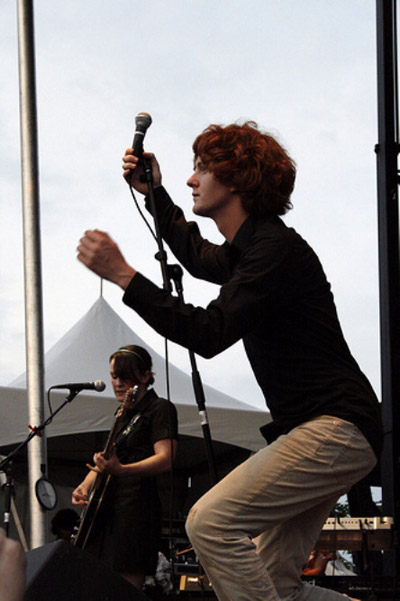
The Most Serene Republic
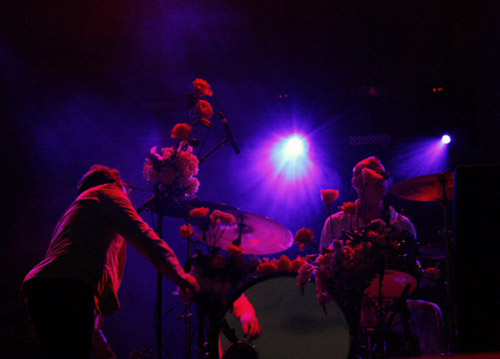
Stars
Hayden continues to affirm the notion that he has flung himself as far away as he can from the characterization of a DIY, solo heir apparent to Beck he was awkwardly pegged as way back in 90-something. His also made his umpteenth reference to the notion that his sophomore album The Closer I Get (1998) received the cold shoulder from critics and never grew with Pinkerton (1996) inevitability with audiences, which is strange given that he’s grown so comfortably into himself as a songwriter. The characteristic growl in “Trees Lounge” was no longer in evidence; “The Hazards of Sitting Beneath Palm Trees” settled easily into his short set alongside “Dynamite Walls” and the beautiful, fundamentally optimistic stage Cohen never moved into of “More Than Alive”; “Did I Wake Up Beside You” was full, taking full advantage of a backing band made up, among others, of some of the members of Cuff the Duke.
During Calexico’s third time playing Bluesfest, it’s become obvious that they are perennial favorites. There’s no better evidence (or, if one wants to read it this way, no bigger disrespect towards one of the festival lineups best respected and most loyal performers) than the fact that they were scheduled to perform at the same time as headliner Brian Wilson.
They played two new songs, one of which remained in the prototypical vein of balladry that makes Calexico the favorite of middle-aged IT workers and soccer moms as well as the mohawked kid who was standing in front of me; the other, titled “Two Silver Trees,” was gorgeous work, vibes resonating and the song structure diverse. Sure to be a highlight of their already sonorous and dense catalogue, the song is concise, accessible rock given depth by Calexico’s now-recognizable touchstones: horns, vibes, and lyrics given pattern by frontier romanticism.
Last year’s performance by Sharon Jones and the Dap Kings constituted a festival highpoint, a pocket of respectability while a few hundred feet away Hedley swarmed the air with their obnoxious emoting. For the hundreds of music fans who were salivating all week for what they knew would be an example of true showmanship, Jones’ set was an incredible balance of her Dap Kings’ musicianship, charisma and just knowing how to work a crowd into having a good time. For a city like Ottawa, whose audiences can charitably be characterized as “unforgiving,” and for me, an Ottawa boy through and through, the set was a revelation.
So when I saw a few familiar faces in the crowd for Jones’ labelmates the Budos Band, an instrumental afro-pop group from Staten Island, it wasn’t a surprise. The crowd was full, though not as overcrowded as a nearby stage’s turnout for returning performers Metric (ugh) and main stage maritime shanty act Great Big Sea (ugh to signify and yet surpass all ughs). Horns have a way of sounding otherworldy in a volume through systems as powerful as those employed by corporate festivals, and the first few songs of their tight set stood dense and incredibly likeable. There was a feel that the audience was seeing something to which they could allude with possessive fervor.
Songs like “Chicago Falcon” and “Up From the South” were highlights, but, like Jones, the Budos Band understand how to create and sustain an overall vibe, never letting the beat drop, keeping the crowd chatter to a minimum. The biggest surprise was that the well-tailored, sunglasses-and-suits characterizations I had envisioned for them gave way immediately to their ten-member jeans-and-t-shirts membership. Really, that could have been my attendance at such an overstylized festival speaking more than my patronage to a truly great act.
Cait: The Love Machine were once again slated to open up for Metric. With a noticeably larger crowd in tow this year, they delivered a great set, previewing numerous songs from their upcoming full-length album and plenty of material from their If You’re a Bird, Then I’m a Bird and self-titled EPs. The poppy quartet, known for their harmonized chants, were accompanied by the River Stage crowd for the multiple “Oh Ohs” on “Western Bird Calls.” Following the Love Machine’s set was the local indie collective known as Jetplanes of Abraham. Consistently switching instruments and roles between songs, JPoA’s performance was entertaining and dynamic. Once the locals had warmed up the crowd, Metric took to the stage and delivered a performance that was lackluster overall in comparison to their opening comrades. Emily Haines rocked back and forth as per usual on her keyboards and seemingly focused on getting the show over with as opposed to developing a rapport with concert-goers.
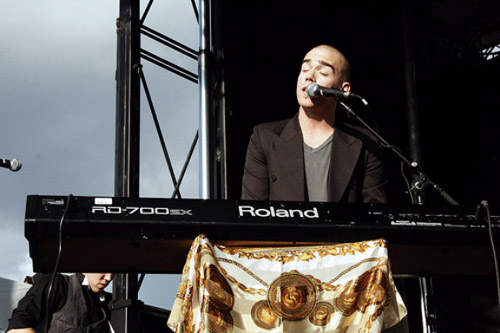
The Love Machine
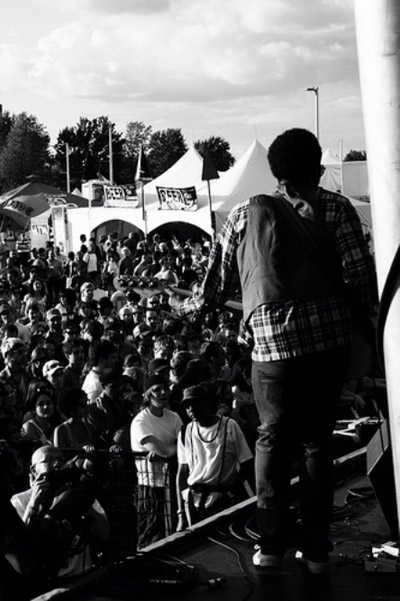
The Love Machine
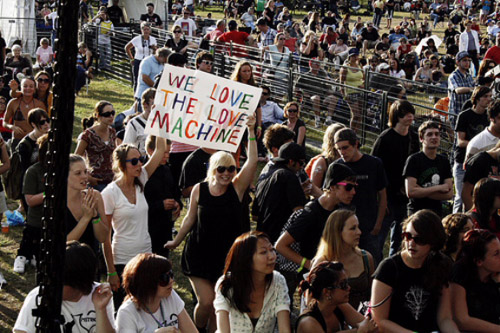
The Love Machine’s Lovers
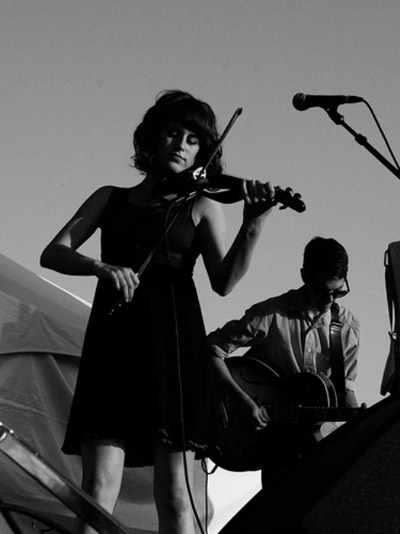
Jetplanes of Abraham

Jetplanes of Abraham
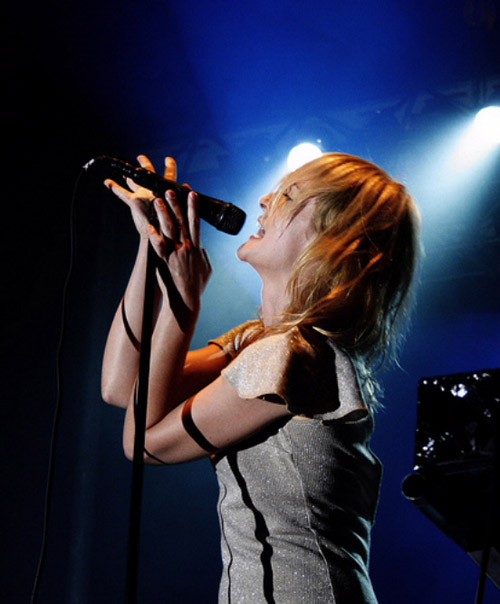
Metric
CMG’s gushing reviews of the HILOTRONS and repeated inclusion in our podcasts risk turning our beloved webmag into an extended love letter, I’ll admit. On the other hand: fuck that. I love the HILOTRONS and, just like last year, they were the best part of this festival. Just like last year they were put on a stage far too big for them and their following, and at 3 in the afternoon. Just like last year the turnout either did not do them justice or was minimized by the ridiculous stage, rocked two nights earlier by Snoop. And, just like last year, frontman Mike Dubue spent some time telling the crowd that because they weren’t dancing that they must be disappointed in the band—never mind that different people enjoy music differently, or that the context of the listening, regardless of how much like a cruise missile their performance once again was, makes it that much more difficult to want to dance.
When one comes away from a HILOTRONS set thinking Mike must be the band’s secret weapon, then from another set thinking drummer Paul Bova is, then guitarist Paul Hogan, you begin to realize that this band is rock solid all the way through, and still Ottawa’s best band. A band as capable as any of managing their sound, they seldom paused in playing through the best songs from Happymatic—like “Dominika,” “Emergency Street,” and “Caught on Video”—and Bella Simone, even managing to squeeze in “Science Fiction Music” from their debut.
Ultimately it was the most appropriate sendoff for an Ottawa listener who simultaneously looks forward to Bluesfest’s seemingly effortless ability to pull acts you’d never imagine coming here and cringes at the thought of what bands they could have gotten and chose not to. There’s no question: Bluesfest is a powerhouse, a major event on the city’s scene. The contracts they make their acts sign, restricting performers from playing too close to their Bluesfest stagetime, shape the landscape of local music for weeks before or to come. Signs of the disaffection were plentiful: blues fans lamented the loss of what felt like theirs; indie fans endured the taste of those they felt beneath them; mainstream listeners endured the grating, nonsensical jabbering of other city’s kids come here to make fun of the festival title, of the absurdity of playing this mishmash of a concept. HILOTRONS are a homegrown act, and one of the best I’ve ever seen, and they’re strangely exiled to the bubble Cisco Systems Bluesfest creates: a black hole into which otherwise artful expression are sucked and taken apart, an arbitrary officer who reconstructs these artists’ identities seemingly without an understanding of their audience and history, let alone writerly goals. I’m left where I am this time of year every year: I thank Bluesfest for the unique experience of a week-long festival in the heart of a perpetually sleepy and largely suburban town where people show up in the tens of thousands to watch music. Get past that fundamental and there are flaws aplenty, many of which it seems might be remedied by compartmentalization, specialization, and an involvement with local trendsetters rather than a juggernaut’s bellow that eradicates all other noise. It becomes axiomatic of the notion that, whatever culture this city desperately needs, it can’t be filled by anything that doesn’t have at least as much personality, as much loyalty to taste, as the audiences it hopes to attract. I love Bluesfest, but it needs to stop growing. It needs to have children.





